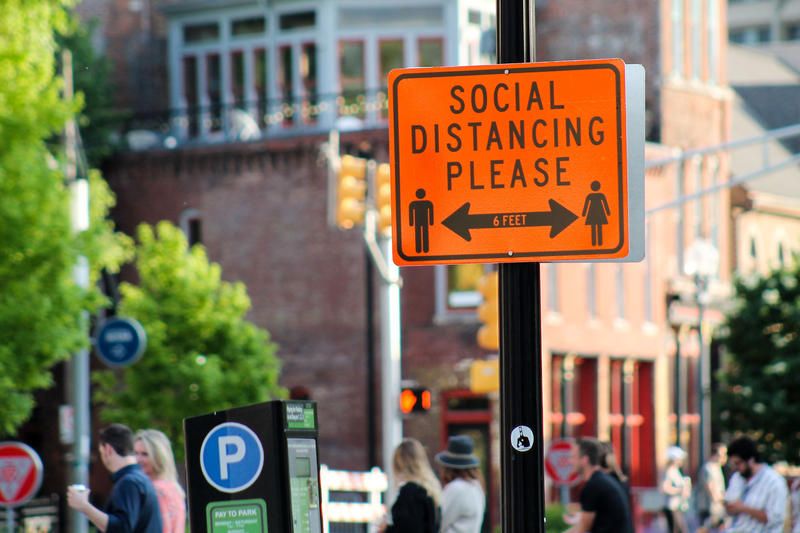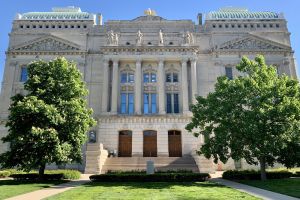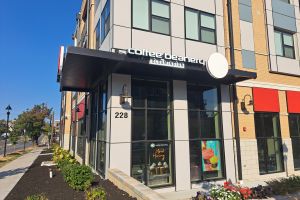
Many businesses have taken steps to enhance safety, but some workers worry protections could be too broad. (Lauren Chapman/IPB News)
Indiana’s State Senate took the first step in fulfilling a party agenda item Thursday.
In passing SB 1, a COVID-19 liability protection bill, the measure is one step closer to becoming law, but worker's rights groups are concerned the state is going too far.
Signing COVID-19 liability protections into law was a session priority for the GOP supermajority. Many states have implemented similar protections and pro-business groups overwhelmingly support the move.
“This legislation is not intended, and will not protect bad actors,” Kevin Brinegar, president of the Indiana Chamber said. “If the business or the facility, the school, whatever, follows the established guidelines, then the suit really is not valid.”
Most business owners agree with Brinegar. He said entities “shouldn’t be subjected a suit when somebody says ‘well, hey, I was wearing this mask most of the time, but I still got the virus, and now I want to sue you because I think your product is defective.'”
For Brinegar, and many other trade groups, the bill provides certainty for their members to operate without fear of frivolous lawsuits. But, not everyone is on board.
Legal experts say some versions of the bill could severely limit the rights of potential plaintiffs.
Many Workers Share Fears Of Being Silenced
“I think the workers that put their lives on the line, like my wife, my grandson that works at the grocery store, [both] union employee[s]. We have to always have a voice,” David Bride said.
Bride is the president of the central Indiana AFL-CIO, a worker rights group. He and his family have been union workers for decades. Remote work in their household was never in the cards.
Bride, his wife, and thousands of other essential workers have kept working in-person since the pandemic began.
Estimates from the United Way show more than half of Indiana’s workers are considered essential.
According to estimates from the Indiana Department of Health, more than 1,000,000 Hoosiers work in essential sectors. While some can work remotely, many like Bride, don’t have that luxury.
He is concerned about extending broad COVID-19 liability protections to employers. His employer--plus many others--take the proper precautions, but he knows that’s not the case everywhere.
“It’s essential that if you are an essential worker that you feel that your job,” Bride said.
Experts have mixed feelings on how legislative language could affect workers and businesses across the state.
The Senate bill, authored by veteran GOP lawmakers Mark Messmer, Eric Koch and Liz Brown, would, among other things, prohibit civil tort cases that don’t meet the gross negligence threshold.
Jody Madeira, a professor at Indiana University’s Maurer School of Law, says the legislature is free to constrain the types of harm about which you can sue.
She believes most provisions strike a balance between competing interests, and supports the legislation’s passage.
“This doesn't prevent lawsuits altogether,” she insists. “Businesses will still have to defend and say, ‘this is what we did. That was reasonable.’”
But, there could be unintended consequences.
“I do think it would have a chilling effect, particularly, plaintiffs themselves might think that they can't win the lawsuit, but lawyers might not take these sorts of suits, unless they're pretty sure,” she said.
Bill supporters say that’s not necessarily a bad thing.
“Often, even if you can win a lawsuit, you may end up settling and paying money out because it's cheaper than then going to court and some protracted litigation,” Brinegar said. “We want these facilities to know that there'll be protected from that so that they can focus on getting their business, their school, their hospital back to normal operations, and not be bogged down with lawsuits.”
Fears Over Bill’s Impact In Certain Sectors
Madeira has specific concerns in locations that were not publicly accessible, like long-term care facilities. Many have been ravaged by the virus, in part due to the vulnerable populations that reside there.
“If the nursing home or long-term residential care facility is sealed, and you can't have visitors, it's going to be hard,” she admits. “Because, no one knows how grandpa or grandma got COVID, right, because no one sees grandpa or grandma," Madeira said.
State health officials have long pinned outbreaks on facility staff, not family visitors.
Madeira believes the threshold in those instances will come down to how prevalent reported outbreaks were.
“There, gross negligence will be premised on the sheer volume of cases that come up, and perhaps the investigations that state authorities would do,” she said.
Before the session began, Zach Cattell, president of the Indiana Health Care Association said he was aware of proposed legislation. “It is important to note that the statute is not blanket immunity, and any healthcare provider is still liable for gross negligence or willful misconduct,” he wrote in a statement.
Indiana has implemented facility-first policies throughout the coronavirus pandemic, which has led to disdain from caregivers.
While a cadre of industry groups testified in favor of the bill, not everyone agreed.
Neil Gath is an attorney that represents the AFL-CIO, a group advocating for more than 50,000 Hoosier workers. He worries the bill sets the bar too high for workers, but has even greater concerns with the House’s version.
If passed, HB 1002 would forbid courts from recognizing local, state, and federal mask mandates. Experts say the mandates could still be argued, but it would be more difficult for plaintiffs.
Additionally, House language would require plaintiffs find an Indiana or surrounding state physician to testify on their behalf.
For Gath, this language places the needs of businesses over the rights of workers.
“If someone followed the rules, and, you know, did the proper precautions, we think they have an argument for immunity. If someone flouted the rules [and] didn't follow the precautions, why should they get immunity for their actions?”
Both Madeira and Gath agree courts will have to interpret how to apply whichever language is passed.
Gath has a hard time thinking about how to argue these cases for clients.
“You'd have to show a very high standard of negligence or intentional conduct by significant evidence,” he said. “It would be multiple high hurdles, you'd have to have very certain facts both medically, and in terms of exposure and carelessness in order to meet that kind of burden.”
Madeira says that could benefit restaurant and bar owners.
“If you were suing a bar, you couldn't use evidence that the state or city said wear masks as evidence that the bar was being negligent," she said.
Bride understands the need to protect businesses, but wrestles with how workers are affected.
“They're in these environments that are risky, and for you to take that away, and basically say, ‘I'm going to trust an employer to do everything possible he can do.’ I don't I just don't agree with that,” he admitted.
Bride believes there is common ground to be found, but remains concerned.
“If you put something in place where the employer doesn't have to worry about consequences of their actions, then that's not good for workers and that's not good for Indiana," he said.
Legislators and trade groups insist they’re not trying limit worker rights, rather shield businesses from burdensome lawsuits.
More than a dozen states have already passed some type of COVID-19 liability protections.
Update: On February 18, 2021 Indiana Governor Eric Holcomb signed SB 1 into law.
For the latest news and resources about COVID-19, bookmark our Coronavirus In Indiana page here.
9(MDIwNjQ2MTYzMDE0NDM1NTQ0OThlYjEzMg001))











